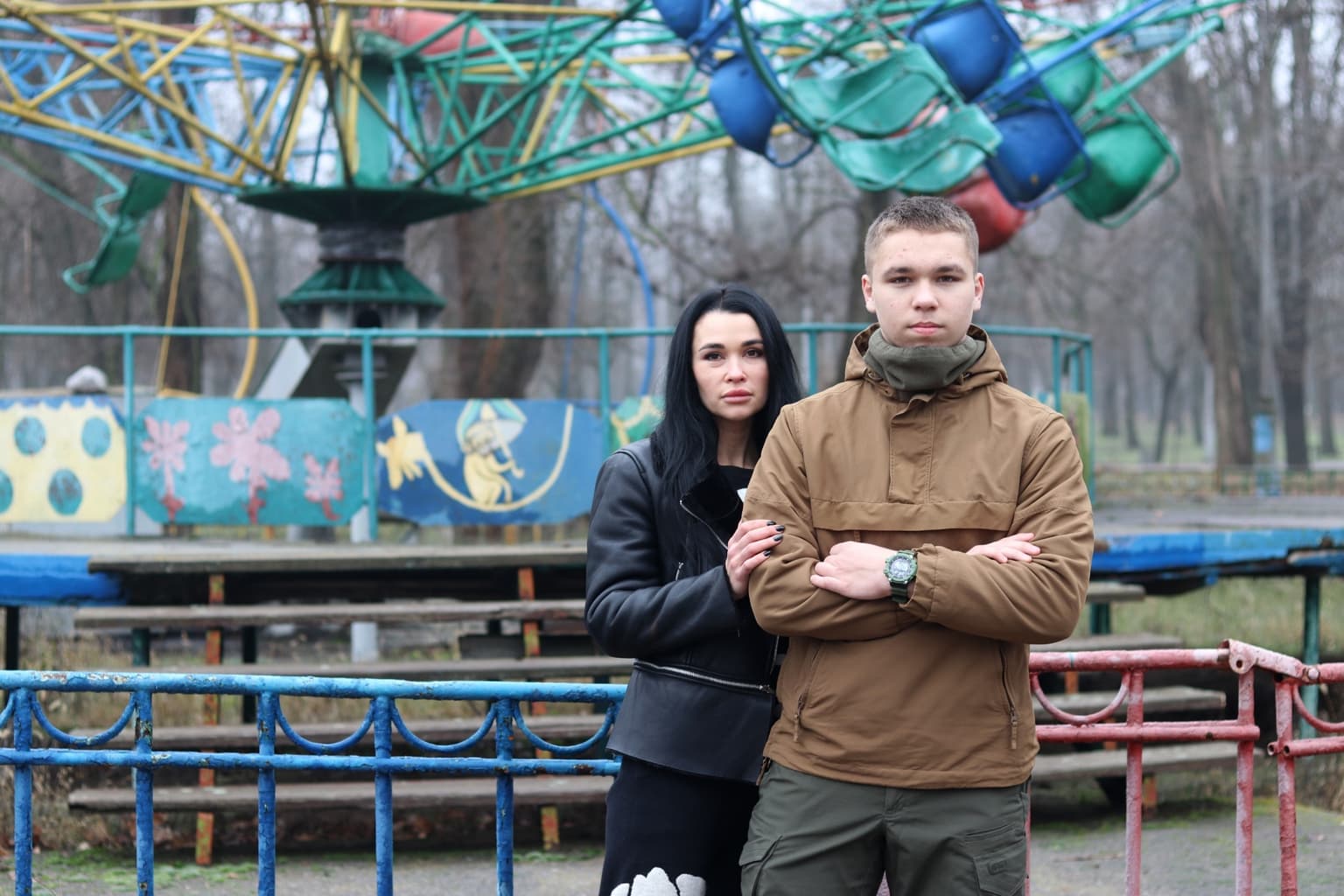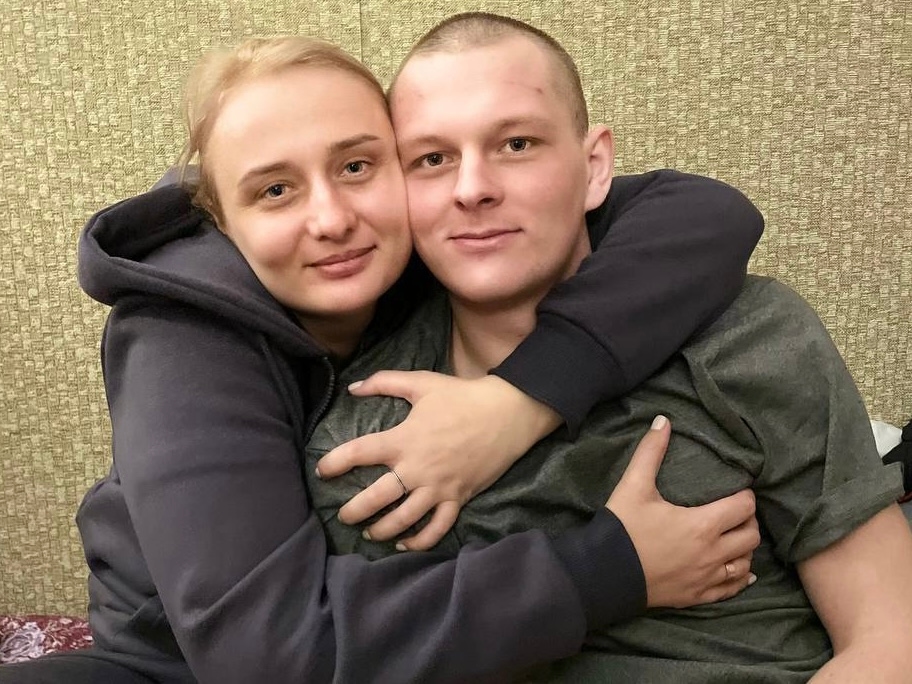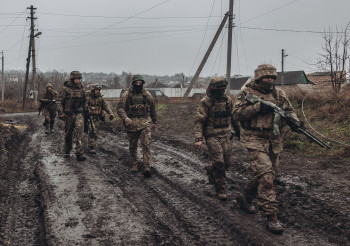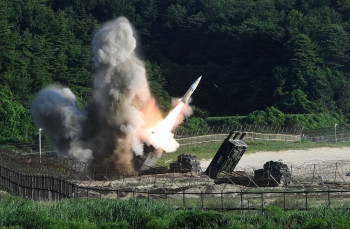Where are they now? Revisiting stories we told in 2022

The lives of millions of Ukrainians turned upside down in 2022, as Russia waged a brutal all-out war against their home.
This year, we interviewed frontline soldiers, released prisoners of war, families of those killed by this war, survivors of Russian occupation and torture, volunteers, and officials. All of them had extraordinary stories to share.
As 2022 comes to an end, the Kyiv Independent revisits the stories of people we interviewed during the war to see how their lives had changed since then.
Story revisited: Wife of Izium mass grave victim learns of husband’s death from viral photo
by Asami Terajima
Celebrating her son Marat’s birthday for the first time without her husband was heartbreaking for Oksana Sova.
Three months after learning about her soldier husband’s death from a viral photo from a mass burial site in Izium, Sova, 37, still feels his presence everywhere she goes.
“It feels like he is still with us, protecting us,” Sova said of Serhiy, a veteran soldier whose body was found in September. He went missing in action in the northeastern Kharkiv Oblast in April.
It was Sova’s first Nov. 16 without hearing Serhiy thanking her for giving birth to two amazing children. Even when he was on the front line, he would always call his wife before sending birthday wishes to 15-year-old Marat or their nine-year-old daughter Elina.
That November day was meant to be the family’s first celebration after burying Serhiy’s body in their home town Nikopol, a city in Dnipropetrovsk Oblast located across the Dnipro River from Russian-occupied territories. Due to continued heavy Russian shelling, the family’s options were limited, but the three of them ate a birthday cake at home and couldn’t stop talking about the father.
The children are keeping their emotions to themselves because they know that their mother would get upset to see them sad and crying, Sova said. It’s also difficult for them to put their grief into words, she added.
“It seems like they can’t take in that their father is gone,” Sova said. “We sit down to eat, and they always talk about what father would have done if he was with us, what he would have said, what jokes he would have made.”
The children’s friends had long fled the heavily bombarded Nikopol. Marat and Elina spend most of their time at home, trying to keep themselves busy with their hobbies. Constant power cuts due to Russian attacks on critical infrastructure now make it almost impossible for them to pursue online education.
There was a time when the family considered fleeing Nikopol. But they decided against it because their elderly grandmother is ill and they couldn’t leave their three big dogs behind.
Despite the danger and the financial struggle due to the lack of jobs in Nikopol, the mother said she wants her children “to find happiness” soon in peaceful Ukraine. She wants Marat to be able to focus on his path to becoming a law enforcement officer and Elina to resume her judo training – like in the pre-Feb. 24 days.
The children, meanwhile, are more worried about their mother than themselves, Sova said.
“They have the fighting spirit of their father,” the mother said, wiping away tears. “They remind me of him.”

Story revisited: What it’s like to know your loved ones are in Russian captivity
by Daria Shulzhenko
Nataliia Sivak hadn’t heard from her brother, Ukrainian soldier Yakiv Nehrii, for nine months.
Nehrii was taken prisoner alongside other Ukrainian defenders in the early hours of the invasion when Russia occupied Ukraine’s Zmiinyi (Snake) Island, a small but strategically important outpost in the Black Sea.
Ukraine eventually pushed Russian troops from Zmiinyi Island in late June.
The Kyiv Independent published a story about Nehrii and two other Ukrainian soldiers in captivity on Nov. 20. Four days after that, on Nov. 24, Nehrii was released. He was among the 50 Ukrainian soldiers who returned home that day.
Sivak says she could not believe it was finally true, even when she heard his voice on the phone.
“I can not express this feeling in words,” she says. “I told him I waited nine long months for him, just like for a baby,” she laughs.
Shortly after the release, Nehrii was taken to Poltava Oblast to undergo rehabilitation there. After he returned, Sivak finally saw her beloved brother.
“I hugged him and couldn’t stop crying,” she recalls.
He looked exhausted, she says, adding that he had lost around 15 kilograms while in captivity. He also has some health issues now. But the most important thing is that he was released, his sister says.
Nehrii told the Kyiv Independent that he had already started losing hope that he would ever return home. Stepping onto Ukrainian land, he felt “extremely happy.”
“I still can’t believe I returned home,” he says.
Sivak says they can not disclose any details about his time in captivity. According to her, 41 defenders of Zmiinyi Island are still held prisoners by Russia.
Despite everything he has gone through since Feb. 24, Nehrii says he will return to fight for his home country after completing rehabilitation.
“I want to continue defending Ukraine,” he says.
Sivak, meanwhile, says she will continue fighting for the release of all the other Ukrainian POWs in Russian captivity, just like she did for her brother.
“I know what they are going through,” she says. “No matter what, we will keep fighting to bring all of them back home.”
Story revisited: Ukrainian civilians fearlessly prepare for Russia's offensive
by Daria Shulzhenko
The Kyiv Independent interviewed Kyiv resident Ruslan Rokhov about how his family was preparing for the then-looming offensive days before Russia started its all-out war against Ukraine.
Before Feb. 24, Rokhov thoroughly planned for different scenarios; he bought plenty of bullets for his carbine rifle, pump-action shotgun, and air pistol, as well as portable gasoline containers and walkie-talkies.
“We were preparing for this,” Rokhov says. “(In the morning of Feb. 24), we took our bags and children and left (Kyiv).”
Using smaller roads just as he planned, Rokhov brought his family to the house of his wife’s parents in Rivne Oblast, west of Kyiv. Their trip took nearly seven hours instead of the four it usually takes because the roads were crowded with escapees from all over Ukraine. Still, they got to their destination safe and sound.
As a regional development expert, Rokhov assisted in establishing a volunteer territorial defense system in Rivne Oblast and spent several nights guarding a road checkpoint there. Rokhov always had his weapons with him but luckily, he never had to use them. The walkie-talkies, however, were helpful at the checkpoint, while portable gasoline containers came in handy when gas stations all over Ukraine were running out of petrol.
He returned to Kyiv soon to protect his family’s property from possible looting. Since Kyiv Oblast was wracked with heavy battles and under partial occupation by the Russian troops, Rokhov began volunteering to help people evacuate from the settlements around the capital. According to Rokhov, he helped nearly 400 people to flee Kyiv Oblast.
The hardest part for him was saying goodbye to his family, who decided to escape Russia’s brutal war by fleeing to Europe in late March. They are safe and live in Germany now. There, his wife helped to launch a school for Ukrainian children. Rokhov has seen his loved ones only four times since the full-scale invasion started and says he misses them a lot.
The family wanted to return to Ukraine in autumn. But Russia’s Oct. 10 mass missile strike on Ukraine – the first in the series of large-scale attacks on energy infrastructure – ruined their plans. The series of attacks killed dozens of people and caused power outages across the country.
Rokhov says his family has been “actively looking for options to organize work and life so that we can be together somewhere,” “anywhere.”
Though Russia’s war changed Rokhov’s life tremendously, his beliefs remained unchanged. During our first interview, Rokhov said that Ukrainians “have proved that if there is a threat, we unite to fight back.” Now, he says, every new act of aggression by Russia “provokes a much greater pushback from Ukrainians, a greater number of donations and unity.”
“I can surely say that aggression will only mobilize Ukrainians even more. It does not scare us but provokes us to reconsider what else we can do for Russia to lose faster.”

Story revisited: Mykolaiv mayor's wartime duty: Taking care of the living, counting the dead
by Alexander Query
Since the liberation of neighboring Kherson on Nov. 11 from Russian troops, life has become quieter in the embattled southern city of Mykolaiv.
The residents of Ukraine’s shipbuilding capital, bombarded for months from the other side of the Dnipro River, finally have a bit of time to breathe despite the hardship of winter, Mayor Oleksandr Sienkevych told the Kyiv Independent in a recent interview.
“After the liberation of Kherson, we had only two attacks from S-300 missiles,” he said.
As a result, many citizens returned to the city with a prewar population of 460,000. Approximately half of them had fled when the Russians attacked the south.
The city now also attracts residents of liberated Kherson, fleeing Russia’s constant shelling of the recaptured city.
Mykolaiv authorities registered about 300 internally displaced people arriving in the city every day. The city officially counted 27,000 displaced people from Kherson between Nov. 9 and Dec. 20.
“They feel safer in Mykolaiv now,” Sienkevych explained.
The winter is challenging due to Russia’s ongoing attacks on critical infrastructure, especially with setting up flats for newcomers.
Still, thanks to policies undertaken since August to repair windows and roofs, many flats are ready for the freezing winter weather. The authorities also prepared 100 distribution points of free drinking water.
Heating was activated on schedule, Sienkevych said, but authorities are still working on providing boiler houses with power generators.
Though the city hasn’t experienced a total blackout so far, scheduled electricity cut-offs are in force. Sienkevych says he doesn’t exclude that the situation might deteriorate due to the ongoing Russian attacks.
Authorities have prepared generators in case of such an emergency but have also opened 12 shelters all across the city where people can stay during a total blackout if they don’t have heating.
“If the situation is absolutely critical, we will have to evacuate people from some buildings or districts,” the mayor said.
Sienkevych is certain of one thing, next year will bring victory to Ukraine.
“We, Ukrainians, are over-motivated, we know what we fight for,” he said. “Just look how the people from liberated territories meet our soldiers – with tears in their eyes, flowers, and words of gratitude.”
Story revisited: Kharkiv Oblast resident forcibly deported to Russia: ‘It’s not a country, it’s a prison’
by Daria Shulzhenko
It’s been a rough year for Kharkiv Oblast resident Ihor Harmash. Russian troops invaded his native village of Lyptsi — located in Kharkiv Oblast, close to the Russian border — in the early hours of the all-out war and occupied it shortly after.
Harmash spent nearly a month under occupation. He saw Russian troops launching attacks on Kharkiv city, shelling civilian houses in Lyptsi, and “hunting” for Ukrainian war veterans in the village. On March 17, Harmash was forcibly deported from Lyptsi to Russia.
He was humiliated and oppressed by a Russian officer at the border. Though Harmash had no money, he desperately wanted to escape Russia and soon found a way to cross to Belarus and then to Poland.
The Kyiv Independent interviewed Harmash in April after he had arrived in Warsaw. Back then, we did not reveal his name and the name of his native village for safety reasons.
As Lyptsi was liberated along with other numerous settlements during Ukraine’s sweeping September counteroffensive in Kharkiv Oblast, Harmash says there’s no longer a reason to keep it a secret. His loved ones survived the Russian occupation.
One day in mid-September, his mother called, saying that “Ukraine has returned.”
“They were so happy about it,” Harmash said.
She told him that Russian troops had searched their house four times. He also learned that they stole his car and used it to block a road during their withdrawal from the village.
Harmash heard many stories about Russian atrocities in the village, with soldiers looting houses and keeping civilians locked in basements. Once, he says, they held a 70-year-old woman as their prisoner for four months after she had asked whether they were Russian or Ukrainian soldiers. A man he knew, who served in Ukraine’s border guard service, has been missing since March 20. Harmash assumes he was killed. Many graves are still being discovered in the area, according to him.
“They have seen so many horrors during the occupation,” he says.
Harmash is still staying in Warsaw, where he found a decent job there and rented a room. He says he does not plan to return home any time soon, as he wants to earn some money to support his parents.
“I want to return home, but after occupation, everything is destroyed there,” he says.
“Every night, I still see nightmares about the war.”
Stories revisited: EXCLUSIVE: Escaping forced conscription in Russian-occupied Donetsk, Escaping Russian army: The story of one Ukrainian forced to fight against his homeland
by Alexander Khrebet
Pavlo just successfully submitted his diploma work in the Russian-occupied eastern city of Donetsk. But several months ago, he was among the Russian troops besieging Mariupol, which is also in Donetsk Oblast. Now Pavlo lives with a disability he acquired while in the Russian army’s service. (Editor’s note: The name has been changed for security reasons.)
Russia forcibly conscripted Pavlo to fight against his country at the start of the full-scale invasion. Though he has a respiratory disease which makes him unfit to serve, Russian staff doing physical checks of conscripted men ignored it.
A week before Russia’s full-scale invasion, Russia started to conscript men in the occupied Donbas. Some managed to flee and avoid conscription, which is a war crime to conduct in occupied territories under international law.
Palvo doesn’t want to look back at his combat experience. His life has been stalled.
“I haven't had anything in my life that would change. At least, haven't killed people or anything like that,” Pavlo told the Kyiv Independent.
He plans to flee to Russia with his girlfriend. He cannot come to the government-controlled territory of Ukraine, as he has no legal protection due to having been in the Russian army.
A Donetsk resident named Yaroslav was more fortunate than Pavlo. He was able to hide from the patrols and flee the city before it was too late. (Editor’s note: The name has been changed for security reasons.)
He moved to Portugal in July, driving there all the way from Donetsk. Now, Yaroslav has little to do except work.
“I don’t see anything but work and a window view of the hills in the Lisbon suburb,” Yaroslav told the Kyiv Independent.
However, six months after fleeing, he is struggling mentally. In a struggle to find better-paid opportunities, Yaroslav switched several jobs and now awaits to start another one soon.
He doesn't want to stay in Portugal. Being in his late 30s, Yaroslav said by the time he learns the language and regains his social status, he will have turned 40.
“I don't want to start from scratch at that age,” he said.
“I had a cool job back in Donetsk. I'm a handyman in Portugal. It's hard emotionally and psychologically to handle the loss of social status,” Yaroslav said, adding that he misses Ukraine.
“You cannot even imagine how hard,” Yaroslav said.
But he admits that he needs to stay in Portugal until the war ends.
“I will come to Ukraine if we win. I won't go to Russia or to (occupied) Donetsk. If Ukraine’s army doesn't liberate Donetsk, I'll move to Kyiv. If it does, I will go back to Donetsk,” Yaroslav said.

Story revisited: Kyiv resident gives birth during war: ‘I forgot about the bombings only in labor’
by Thaisa Semenova
Kyiv resident Mariia Shostak, 26, doesn’t know what it’s like to be a mother in peacetime — Russia’s war robbed her of that experience.
“The challenge of motherhood overlapped with the challenge of living in the midst of the war. And, frankly, it’s hard for me to say what is more difficult,” she said, half-joking.
She gave birth to her first baby on Feb. 25, the second day of Russia’s full-scale invasion of Ukraine, in the basement of a hospital in Kyiv.
The first year of her motherhood has been far from what she anticipated while pregnant. She thought her life would revolve solely around caring for her child and was anxious about taking maternity leave and potentially losing touch with childless friends.
Instead, she had to return to work in June: When her husband lost his income due to war, the couple decided he would stay at home to care for the baby.
“Maybe I am the kind of person that tries to use any situation to my advantage, or it is a psychological defense mechanism, but I don’t feel like I lost my previous life or anything really,” she told the Kyiv Independent.
Despite the challenges due to the blackouts caused by repeated Russian attacks on Ukraine’s energy infrastructure, Shostak finds that these difficulties have made her more disciplined and efficient.
In the evenings, she and her husband enjoy candlelit dinners, strengthening their bond as they are not distracted by their phones or TV.
“In normal circumstances, we would be tempted to check Facebook or watch TV in the background. Now when we are together, we are fully present and focused on each other.”
The family is planning to celebrate New Year’s at a mountain resort, looking for a chance to relax and give their son a break from the turmoil of war.
“My son deserves it — he is not to blame for what is happening. We need to put up a Christmas Tree, celebrate, and give each other gifts as life goes on.

















